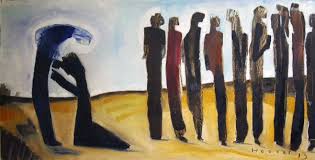
Our Daily Bread
The “Our Father” has a special place among Christian prayers because, according to the gospels of Mathew and Luke, it’s “the Lord’s Prayer,” taught to his disciples by Jesus himself.
But like all prayers that we know from memory, it can become rote – mechanical and repetitious, bringing to mind Jesus’ quotation from the prophet Isaiah in Mathew’s gospel: “This people honors me with their lips, but their heart is far from me.”
I’ve tried to become more conscious of the words in the Our Father as I pray, and the prayer’s phrase, “Give us this day our daily bread,” has become especially meaningful.
Easy Access
Many of us in the western world have become so accustomed to having easy access to food, “our daily bread,” that we never think about the possibility of it becoming scarce. But the pandemic has changed that, just as it has changed many of our presumptions about health and safety and contemporary humanity’s ability to control things.
Citing the pandemic and consequent labor shortages, problems with trucking and shipping, severe weather and climate change, the news media and social media report lots of empty shelves in many supermarkets.
“We’re really seeing the perfect storm,” Phil Lempert, editor of the website SupermarketGuru.com, told National Public Radio (NPR).
The NPR article says the shortages are uneven throughout the country and that so far, have been temporary. Still, they destroy the widely-held presumption that for those who have money, food will always be there. And they make the phrase “Give us this day our daily bread” much more meaningful.
The Way of Insight
A staple of the diet of people living at the time of the writing of the Hebrew Bible, bread also had several symbolic meanings, including wisdom. That seems to be the case in the Book of Proverbs when the personified “Wisdom” urges her readers (or listeners) to “Come, eat of my bread and drink of the wine I have mixed. Leave simpleness, and live, and walk in the way of insight.”
For me, we are not only asking God in the Our Father for a continuation of the availability of food, for us and all humanity, but for wisdom, without which the search for God is useless.
Wisdom, of course, doesn’t mean “being smart,” nor does it require a college education or any formal education. That’s because it’s not a matter of what you know but how you know, that is, how you see yourself and reality and the ability to put things in perspective.
For people searching for God, that means properly assessing our skills and abilities and our place in the world and placing God in the center where God belongs, no matter the doubt and no matter the trends in contemporary society.
Those of us fortunate enough to have some “amount” of faith, and to belong to a community of believers, rightly rely for our source of wisdom on the teachings of the Bible and “tradition,” which Dominican priest Timothy Radcliffe describes as a “continual source of newness and vitality.”
The Foolish to Shame the Wise
The apostle Paul helped the Christians at Corinth put themselves in perspective. “For consider your call, brethren,” he advised. “Not many of you were wise according to worldly standards, not many were powerful, not many were of noble birth but God chose what is foolish in the world to shame the wise, God chose what is weak in the world to shame the strong….”
Those non-believers who consider their search for God to be in vain can provisionally look to all the wise people around us who continually show the spark of God’s wisdom.
In his book, “What is the Point of Being a Christian,” Radcliffe quotes Mindy Thompson Fullilove, M.D., an American social psychiatrist, writing about an extinct neighborhood in Pittsburgh where Irish, Polish and Italian immigrants struggled to reconcile differences.
“Neighborhoods were not just places where people lived together,” she writes. “They transmitted wisdom, the knowledge of how to resolve conflicts, of how to cope with difference.” Lots of contemporary people do that on a daily basis.
Believers and non-believers need both kinds of our daily bread.



